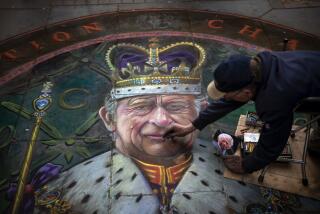Britain tunes in to follow voting returns
- Share via
LONDON — In an era when people are exercising their right to vote more vigorously over reality TV shows than, say, the congressional midterms, it is refreshing to discover television producers are still capable of putting something intelligent on the ballot for us once in a while.
Of course, you have to be in Britain to see it. Sunday night, at least 4 million viewers (proportionally, that’s equivalent to about 18 million Americans) are expected to tune in to BBC2 for the final night of “Great Britons,” an interactive show taking a digital straw poll on which Briton is the greatest figure in the country’s history.
Shakespeare or Churchill? Darwin or John Lennon? It sounds like the sort of slurry pub argument you’d want to beat a retreat from after a while -- especially since the late Princess Diana has also sneaked into contention. But in the hands of the BBC it has become part of the national conversation in Britain, a smart, entertaining competition that proves television viewers will tune in and vote on more challenging fare than which annoying hard body to toss off an island.
The scheme is so simple it could have come from a game played to amuse the family on long drives -- which, in a way, it did. The concept springs from a mind game that Jane Root, the head of BBC2, devised to pass time with her father, James, while they both sat in a hospital waiting room after her mother became ill two years ago.
“I just asked Dad which Briton he thought was the greatest of all time -- ‘Not Churchill,’ he said right away, he doesn’t like Churchill -- and we just talked on and on about it,” recalls Root. From conversation to television was an easy step: The 10 finalists were simply the top vote-getters from nominations submitted by the public, a process that left plenty of grand names -- from Henry VIII to Margaret Thatcher and current soccer star David Beckham -- out of the finals. The BBC then commissioned a documentary or dramatized show on each of the top 10, presented by an advocate from politics, media or celebrity academia.
It has been running twice a week for five weeks, with viewers voting by telephone, the Internet or through their digital TVs after each show.
“It’s nice to do some proper television for a while. It shows there is a mass of intelligent people out there not being served by one more ‘Celebrity Big Brother,’ ” says Jeremy Clarkson, a well-known television presenter, as they are called here, who stayed at the BBC to do “Britons.” Clarkson championed Isambard Kingdom Brunel, the Victorian engineer who built the ports and bridges that defined Britain’s Industrial Age.
But Diana “still has a shout” at first place, says Clarkson. Billed as the compassionate candidate who finally taught the British how to emote, the late princess has stayed stubbornly second throughout, just ahead of Churchill and far ahead of serious candidates like Adm. Horatio Nelson and Isaac Newton.
“Diana still has a following, especially among all those 9,000-year-olds watching,” Clarkson says. “But that’s OK. She’s splitting the old vote that would otherwise go to Churchill, that drunken Kurd killer.” It is a passing sneer at the violence of Churchill-led military campaigns in the Middle East, but Clarkson is mostly kidding. He actually thinks Churchill has the best shot at catching Brunel on Sunday night, when the 10 advocates gather for a live, final, two-hour free-for-all that will conclude with a winner.
Who would have figured a show pitting a Victorian engineer in a stovepipe hat against a pop princess would find an audience?
More to Read
Sign up for Essential California
The most important California stories and recommendations in your inbox every morning.
You may occasionally receive promotional content from the Los Angeles Times.













